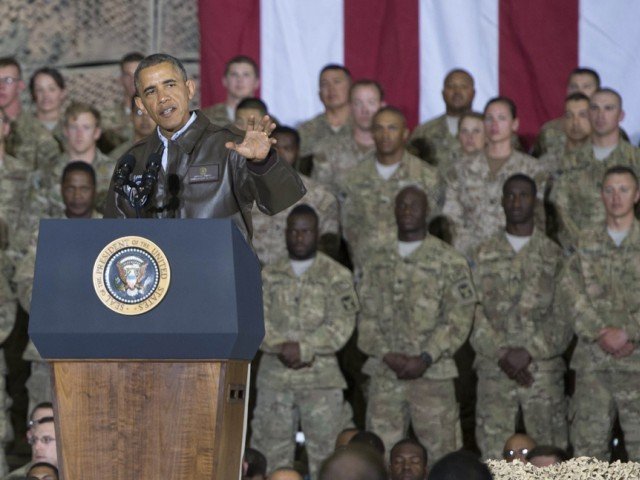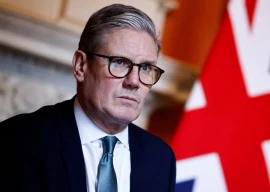
As we have seen, military interventions tend to provide an impetus for extremism and a breeding ground for terrorists, which only further exacerbates the problem. We, and this region, are all too familiar with war and its aftermath. In addition to expending blood and treasure, the effects and repercussions of war do not remain confined to one generation; they are passed onto future ones. Mass displacements and mass demolitions of cities, towns and villages, are just some of the most visible externalities of war. Considering that Afghanistan has been in a state of perpetual conflict since the Soviets invaded it in 1979, the fallout of that nine-year occupation is still being felt and experienced to date. Since the US-led invasion of Afghanistan in 2001 — even though the terror infrastructure has been dismantled to a great extent — terrorism continues to exist, and rather thrives, coupled with organised crime.
On the receiving end has been Pakistan. We have been damned for assisting this UN-sanctioned war and damned for not doing enough. However, not discounting the ground realities in Afghanistan, it is essential that at least, a residual US troop presence in the country remain so as to bring Afghan security forces up to par with the standards required to fully impart their responsibility of securing that country’s borders and establishing the writ of the state, which is, at the moment, scant and limited to the capital and mostly in the western parts of the country. The southern and eastern provinces still remain largely ungoverned spaces and this problem must be urgently addressed.
We hope that the Obama Administration, for the remainder of its term, at the very least, assists to the fullest Afghanistan in the transfer of power to whoever wins the presidency in the run-off next month. Though US President Obama has said that his country will retain a force of 9,800 following the withdrawal of international forces at the end of this year, his administration must make sure that the Afghan government and its security forces are able to, at least, maintain some semblance of order so that Afghanistan is not used by non-state actors to plan and execute international acts of terror. This, of course, will be bearing only if the Afghan government signs the Bilateral Security Agreement, which President Hamid Karzai has so far refused to sign. The country’s future also depends upon the stalled peace dialogue with the Afghan insurgents and before the US entirely withdraws by 2016. It must now work towards bringing the insurgents into the fold. As it is, Pakistan bears the brunt of cross-border terrorism, while the Afghan government has acted like a bystander. This is an extremely serious matter that needs to be addressed if this region is to remain peaceful and the relationship between neighbours cordial. Pakistan has legitimate interests in making sure that Afghan soil is not used for illicit purposes against it, and in the event that such concerns are not paid heed to, it cannot be blamed for acting in its self-interest.
Unless words and commitments are not translated into action, cliches like peace is long overdue and hard earned will only remain just that: cliches. The US, as it transitions into a more advisory role in Afghanistan, must make sure that it remains engaged in the region for the long term and does not repeat the same mistakes it made by abandoning Afghanistan following the Soviet withdrawal in 1988. Only then will the US withdrawal be responsible. Otherwise, we could experience 2001 and a similar aftermath all over again.
Published in The Express Tribune, June 2nd, 2014.
Like Opinion & Editorial on Facebook, follow @ETOpEd on Twitter to receive all updates on all our daily pieces.
COMMENTS (5)
Comments are moderated and generally will be posted if they are on-topic and not abusive.
For more information, please see our Comments FAQ





1732354127-0/Untitled-design-(3)1732354127-0-270x192.webp)


1732344836-0/BeFunk_§_]__-(37)1732344836-0.jpg)








@Aschraful Makhlooq "Obama now find another country for invasion after Afghanistan because to interfere in the other countries matter in any forms and manifestation is your most favorite hobby passion because old habit goes hard and you have proven this phrase absolutely and precisely true……"
I agree with you. Pakistan would be a good choice.
Obama now find another country for invasion after Afghanistan because to interfere in the other countries matter in any forms and manifestation is your most favorite hobby passion because old habit goes hard and you have proven this phrase absolutely and precisely true......
It was not out of ignorance or irresponsibility that US abandoned Afghanistan after Soviet withdrawal.It was a policy matter. The US wanted to test the wisdom, statesmanship and farsightedness of it's minions, i.e. Pakistan, Saudia, and others who had played an important role in the Afghan 1979-88 war.
And the minions proved to be what we have been witnessing since then. They created Taliban, supported Haqqanis, wanted to create a "strategic depth" in Afghanistan against the infidel on the east. They created terrorism and brought religion into politics for their own shortsighted gains.
Has statesmanship been prudently done then, this part of world would have been a peaceful prosperous place.
This at best is crocodile tears. Ananlysts in the west have said that Obama administration is doing its damnedest to ensure that the post-withdrawal Afghanistan has a government that Pakistan can accept. In other words, Afghan Taliban should be part of Afghan government. Pakistan’s objective in ensuring that is that it may have the new Afghan government under some sort of Pakistani influence through the Afghan Taliban. That, however, is unlikely to bring great benefit to Pakistan. During 1996-2001 Afghanistan was under a professedly Islamist government of the Taliban, which was recognized by only Saudi Arabia, UAE, and Pakistan. That government had the temerity to have as its guests Al Qaeda led by OBL. And what did Al Qaeda do? They distinguished themselves by trying to beard the lion in its own den: they launched 9/11 on USA. The rest of the story we know. Pakistan escaped being part of the victims of the US-led invasion of 2001 by Musharraf’s timely submission to US wishes well in time. Otherwise Pakistan would have been at the receiving end then. Pakistan repeating the exercise after 2014 shall without doubt achieve similar consequences. It can, and on present showing it decidedly will, use terrorists freed from ‘duty’ in Afghanistan against India in Kashmir and other areas of India. As it is, Pakistan hobnobbing with terrorists of various hues has been experiencing the consequences for several years, with the civilian government, the army, and ISI in no position to stop even home-bread terrorists against targets and people within Pakistan. This is so much so that Nawaz Sharif is driven to negotiate with TTP to find some kind of accommodation while the TTP have left no one in doubt that they reject Pakistan’s state, government, and Constitution and that all of it will have to go lock stock and barrel to make room for an overtly Islamic dispensation in place of the present one. We must admire Pakistan’s optimism in believing that it can use Afghan and other foreign terrorists in Kashmir and elsewhere in India successfully, with India’s new ultra-nationalist government just looking on. It will be interesting to see how Modi will respond when Pakistan-sponsored terrorists will cause havoc in India. V. C. Bhutani, Edinburgh, 2 Jun 2014, 1640 GMT
Pakistan bears the brunt of cross-border terrorism, while the Afghan government has acted like a bystander. . Combo of selective memory and alot of gall. Afgan govt may have been a "bystander" for the last couple of years but Pakistan has been actively supporting the Haqqani for over 12 years - how about fixing that before picking on Afghanistan?